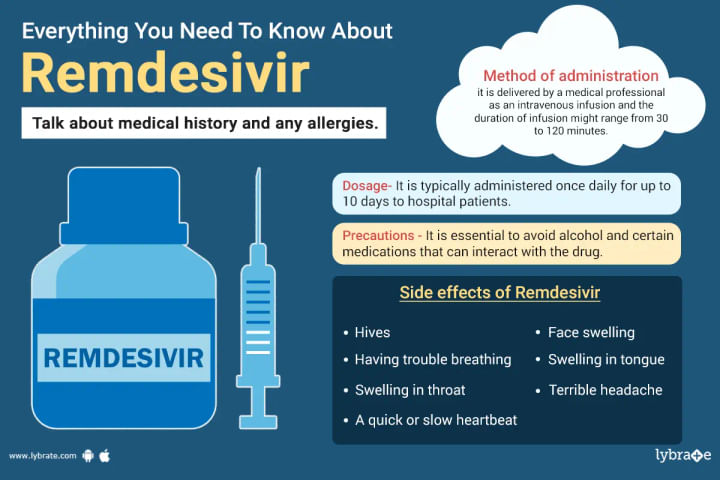Understanding Remdesivir: Everything You Need to Know
Remdesivir is an antiviral drug used to treat individuals with positive results for COVID-19. It has been approved for the treatment of COVID-19 and works by preventing the virus from replicating and disseminating itself throughout the body.
It can be used by adults and kids who are at least 28 days old and 7 pounds or more (3 kilograms). It is offered to patients who are undergoing medical treatment as well as those with mild-to-moderate COVID-19 who are at a high risk of developing severe COVID-19.
As the world continues to grapple with the ongoing pandemic, understanding the role that remdesivir plays in treating COVID-19 has become increasingly important. In this article, we'll explore what remdesivir is, how it's given, what to expect during treatment, and more.
What is Remdesivir?
Remdesivir is a prescription medication that belongs to a class of drugs called nucleoside analogs and has been specifically developed to treat COVID-19. It was first developed by Gilead Sciences and was initially tested as a potential treatment for Ebola and other viral diseases.
It's an antiviral drug that works by inhibiting the replication of the virus and slowing its spread throughout the body. This can help reduce the severity of symptoms and improve recovery time. After the outbreak of COVID-19, remdesivir quickly gained recognition as a promising treatment option for the virus.
Things to be Discussed with Healthcare Provider Before Receiving Remdesivir
Before receiving remdesivir, it's important to discuss your medical history, any current medications you're taking, and any other treatments you're receiving with your healthcare provider. They can help determine if remdesivir is right for you and ensure that you receive the most effective treatment.
Talk About Medical history, and any Allergies
Before receiving remdesivir, it is important to discuss with your healthcare provider if you have any allergies or past medical history of liver or kidney disease. Additionally, let your doctor know if you're expecting or nursing a baby.
Patients who are sensitive to the medication shouldn't take remdesivir. Patients with conditions like;
- Liver disease
- Kidney diseases
- Pregnant
- Breastfeeding
- Any kind of Allergy
How is Remdesivir Given?
Remdesivir is given as an intravenous (IV) injection and typically takes about 1 hour to administer. The medication is delivered directly into the bloodstream through a vein and is administered in a hospital or clinical setting under the supervision of a healthcare provider.
Method of administration: Remdesivir is delivered by a medical professional as an intravenous infusion
Length of infusion: The duration of the infusion might range from 30 to 120 minutes
Before receiving remdesivir
All the essential information provided by you will help your healthcare provider determine if remdesivir is appropriate for you and to monitor for potential side effects.
Blood tests: In order to ensure that you may use remdesivir safely, your doctor will do blood tests on you.
Dosage
For those in a hospital: Remdesivir is typically administered once daily for up to 10 days to hospital patients
For those not in a hospital: Remdesivir is typically administered once day for three days to those who are not in a hospital
Monitoring: You will require routine blood tests to assess the health of your liver, and you must continue to be treated under a doctor's supervision
Missed Doses and Overdose
If you miss a dose or believe you may have received an overdose of remdesivir, it's important to inform your healthcare provider. They will provide you advice on the next actions you should take to carry out your treatment.
Missed doses: It is unlikely to miss a dose as remdesivir is administered in a clinical setting
Overdose: Because the medication is administered by a healthcare practitioner in a medical setting, an overdose will be immediately handled. Symptoms of an overdose may include seizures, difficulty breathing, and irregular heartbeat
Monitoring: You will require routine blood tests to monitor your liver's health, and you must continue to be under a doctor's supervision while undergoing therapy
Precautions while Receiving Remdesivir
While receiving remdesivir, it's essential to avoid alcohol and certain medications that can interact with the drug. You will receive a list of medications and other things to avoid from your healthcare professional.
Observe any dietary, beverage, or activity limitations that your doctor prescribes.
Interaction with Other Drugs
Remdesivir may interact with certain drugs, like chloroquine or hydroxychloroquine, as these medicines may make remdesivir less effective. The use of remdesivir may also interact with other drugs, including;
- Prescription
- Over-the-counter medications
- Vitamins
- Herbal products
All current drugs must be disclosed to the doctor by the patient.
Side Effects of Remdesivir
Remdesivir could result in both minor and major adverse effects. Patients may occasionally encounter negative effects when taking remdesivir. If patients have symptoms of an allergic response, including but not limited to;
- Hives
- Having trouble breathing
- Face swelling or Lips swelling
- Swelling in tongue
- Swelling in throat
- Terrible headache
- A quick or slow heartbeat
In the event that you have any side effects, particularly serious ones, you must immediately notify your healthcare physician.
Additional Information
For more information on remdesivir, including its uses, administration, side effects, and more, speak with your healthcare provider or visit the of Central Drugs Standard Control Organisation(CDSCO) website.
Conclusion
Remdesivir, an antiviral medication, is used to treat COVID-19 patients. This medication is appropriate for patients who are hospitalized or who have mild to moderate COVID-19 and are at high risk of progressing to severe COVID-19. Patients must inform their doctor of their medical history and current medications before receiving the treatment. The side effects of remdesivir include nausea and abnormal liver function tests. Patients must also inform their doctor if they are taking any other medications, as remdesivir may interact with them.



+1.svg)
